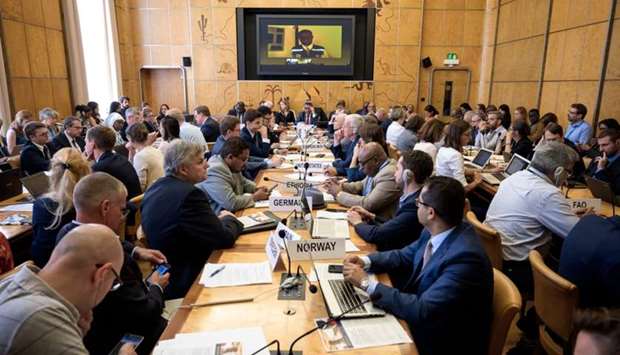Authorities in Democratic Republic of Congo have appealed for calm after an evangelical preacher fell ill with Ebola in the eastern city of Goma, the first recorded case of the disease in the urban hub in a nearly year-old epidemic.
Goma, which has a population of around one million, is the capital of North Kivu province, the epicentre of an outbreak that has claimed more than 1,600 lives -- the second highest toll in Ebola's history.In a statement, North Kivu governor Carly Nzanzu Kasivita stressed the new case "not only was detected at an early stage but also was isolated immediately, avoiding any further contamination."
"I call on the population of the city of Goma and its outskirts to keep calm... (and) cooperate with response teams by observing hygiene and prevention measures and notifying any suspected case of Ebola," he added.
According to the latest health ministry figures issued on Saturday, 1,655 people have died from the haemorrhagic virus since August 1 last year, when the disease broke out in North Kivu and spread to neighbouring Ituri.
Nearly 700 people have been cured, and more than 160,000 been vaccinated.
But efforts to roll back Ebola have been hampered by insecurity in a region plagued by militia groups, who have attacked treatment centres.
Local hostility to health workers trying to trace and isolate people in contact with Ebola patients is another hurdle.
Two more Ebola workers were murdered in their homes in North Kivu after months of threats, the ministry said.
The Goma patient was described as a pastor who had been on a trip to another town, Butembo, one of the towns hardest hit by the outbreak.
There, he preached at seven churches and regularly touched worshippers, "including the sick," the health ministry said Sunday.
His symptoms first surfaced last Tuesday, it said.
On Friday he took a bus back to Goma from Butembo, along with 18 other passengers and the driver.
He went through several health checkpoints on the road between Butemo and Goma "but did not seem to show signs of the disease.
However, at each checkpoint, he wrote down different family names and forenames on the passenger list, which probably indicates a will to hide his identity and state of health," the ministry said.
When he arrived in Goma on Sunday morning, he went to a clinic because he didn't feel well and started to become feverish, the ministry said.
"Given that the patient was quickly identified, as well as all the passengers on the bus from Butembo, the risk of the disease spreading in the city of Goma is low," it said.
The pastor was swiftly taken back to Butembo, the governor added.
The other passengers and the driver will be vaccinated against Ebola on Monday, said the ministry, urging the population of one of Africa's largest countries to "keep calm".
The United Nations was convening a "high-level event" in Geneva on Monday to discuss response and preparedness for the Ebola outbreak.
It will be attended by government ministers from the DR Congo and Britain, senior officials of the World Bank, the World Health Organization (WHO), and other UN agencies.
Last month, the WHO said the outbreak did not qualify as an international threat -- a category that significantly ramps up global response to a contagious disease.
Its decision took into account cases of infection that surfaced in Uganda among a family that had travelled to eastern DR Congo to see a relative stricken with Ebola.
Ebola spreads when humans touch the blood, body fluids, secretions or organs of an infected person, or objects contaminated by such fluids.
Experts fret when a contagious disease occurs in a city, where contact, mobility and anonymity make it far harder to contain an outbreak than in the countryside.
The driver of a motorbike taxi in Goma, who gave his name as Jean-Pierre, aged 30, said, "I hope the authorities do everything to trace these people -- Goma is a huge crossroads, leading to several destinations."
Health workers in Goma were vaccinated as early as December when the outbreak first hit Butembo further north.
The latest epidemic is the 10th documented outbreak in DR Congo since the disease was identified in 1976 near the Ebola River, which gives it its name.
It is the second deadliest on record globally, after the epidemic that struck West Africa in 2014-2016, killing more than 11,300 people.

